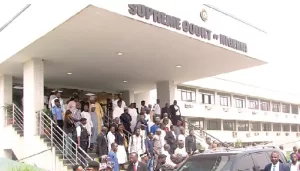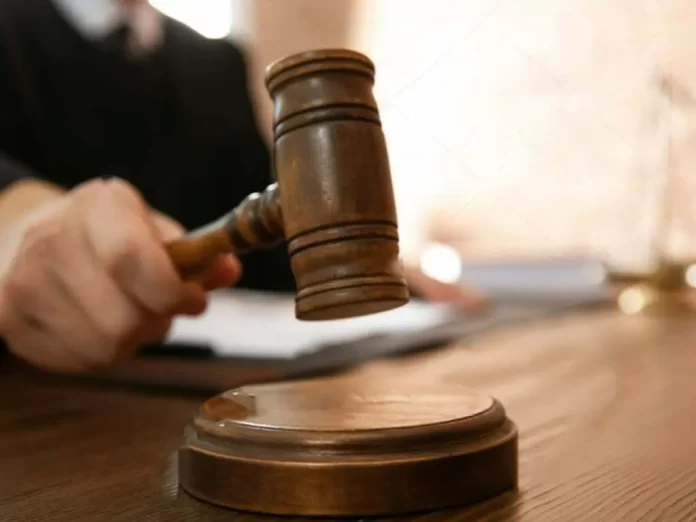The Supreme Court of Nigeria has dismissed a suit filed by 16 states of the federation challenging the constitutionality of the Acts establishing the Economic and Financial Crimes Commission (EFCC), the Independent Corrupt Practices and Other Related Offences Commission (ICPC), and the Nigerian Financial Intelligence Unit (NFIU).
The court ruled that the suit lacked merit.
In a lead judgment delivered by Justice Uwani Abba-Aji, the court held that the plaintiffs—16 states including Ondo, Edo, Oyo, Ogun, Nassarawa, Kebbi, Katsina, Sokoto, Jigawa, Enugu, Benue, Anambra, Plateau, Cross River, and Niger—were wrong in their assertion that the EFCC, created by an Act of the National Assembly, was an illegal body.
Justice Abba-Aji, who led a seven-member panel of justices, ruled that the EFCC Act does not require the ratification of state Houses of Assembly, as it is not a treaty but a convention.
She emphasized that the EFCC Act, passed by the National Assembly, is in line with the country’s constitution and does not violate the provisions of Section 12 of the 1999 Constitution, as argued by the plaintiffs.
The court also dismissed all objections raised by the Federal Government regarding the suit, affirming that the case, which was filed by the attorneys general of the 16 states, was properly within the jurisdiction of the Supreme Court as it involved a challenge against the Attorney-General of the Federation and not the agencies themselves.
The case had initially been filed by the attorneys general of 16 states, who sought the scrapping of the anti-graft agencies. However, some states withdrew from the suit, while others requested to be joined as co-plaintiffs.
Imo, Bauchi, and Osun states joined the suit as co-plaintiffs on October 22, 2024, while Anambra, Ebonyi, and Adamawa states withdrew their participation, leading to the striking out of their suits.
The plaintiffs argued that the EFCC Act, enacted in 2004, contravened the provisions of the Nigerian Constitution. They cited a ruling from the case of Dr. Joseph Nwobike Vs Federal Republic of Nigeria, in which the Supreme Court had held that the EFCC Establishment Act was based on a UN Convention against corruption.
They contended that Section 12 of the 1999 Constitution required the majority of state Houses of Assembly to approve such a convention before it could be incorporated into Nigerian law.
Since, according to the plaintiffs, this approval was never obtained, they argued that the EFCC and the other agencies established under the laws were unconstitutional and should be declared illegal.
The plaintiffs further claimed that the law could not be applied to states that had not consented to it, in violation of the Constitution, and that any institution created under such a law should be regarded as illegal.
In defense of the EFCC’s constitutionality, the agency’s Director of Public Affairs, Wilson Uwujaren, expressed shock over the challenge to the agency’s existence, emphasizing its crucial role in fighting corruption in Nigeria.

READ ALSO: Tinubu Appoints Atiku’s former spokesperson, Daniel Bwala, as Special Adviser
Speaking on Channels Television’s *The Morning Brief* on October 21, 2024, Uwujaren said, “We are really shocked by what is happening. Nigerians should see through this shenanigan and oppose it because I don’t see how this country can survive without the EFCC with the kind of corruption problem that we have. Nigeria cannot do without the EFCC.”
Uwujaren further suggested that the plaintiffs were likely motivated by a desire to avoid accountability for corruption, stating, “Those behind this challenge are feeling the heat of the EFCC’s work and do not want to be held accountable.”
Despite the legal challenge, the Supreme Court’s ruling has reaffirmed the legality of the EFCC, ICPC, and NFIU, marking a significant victory for the anti-corruption agencies.
The court’s unanimous decision to dismiss the suit clears the way for the continued operation of these bodies, which play a central role in the fight against corruption in Nigeria.
This ruling comes amid growing concerns about corruption in Nigeria, and the EFCC, in particular, has been at the forefront of efforts to curb financial crimes and hold individuals accountable.

